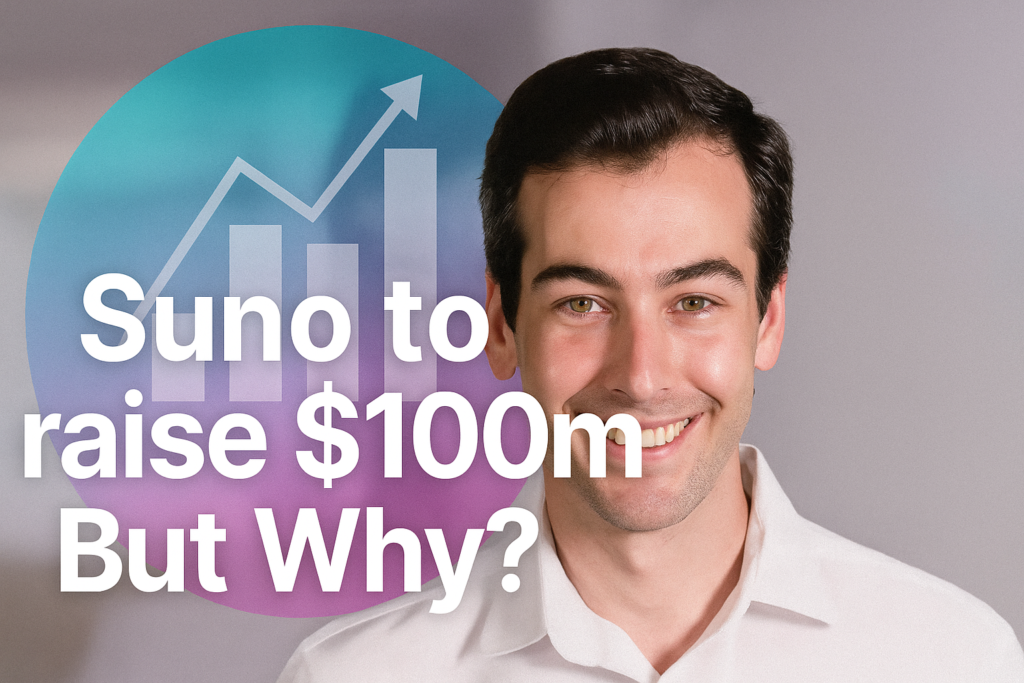The AI music industry stands at a defining crossroads, and Suno is commanding this transformation. The Cambridge-based startup demands attention with talks to raise over $100 million at a staggering $2 billion valuation. This isn’t incremental growth—this is a seismic shift that forces one critical question: what’s driving this unprecedented AI music funding frenzy? Let’s cut through the noise and expose the powerful forces behind this groundbreaking round, even as major record labels wage legal war against them.
Valuation Skyrockets to $2 Billion: The Undeniable Growth Reality
Suno’s valuation has quadrupled from $500 million to $2 billion in just 17 months—a fourfold increase that proves market validation beyond doubt. This explosive growth stems from legitimate user adoption: 10 million users worldwide creating songs from simple text prompts. Powerhouse investors including Lightspeed Venture Partners, Nat Friedman, and Matrix Partners—the same firms backing Stability AI and Mistral—secured $125 million in Series B funding in May 2024. The platform democratizes music creation instantly, allowing anyone to generate complete songs with vocals, lyrics, and instrumentals in minutes. This isn’t speculation—it’s documented market transformation happening right now.
$100M Annual Revenue: The Money Speaks Truth
Here’s the undeniable fact driving investor conviction: Suno generates over $100 million in annual recurring revenue—actual money flowing today. The freemium model proves brilliantly effective: free users get 10 songs monthly, while the Pro plan ($8/month) delivers 500 songs and Premier ($24/month) provides 2,000 songs monthly. This revenue milestone, achieved despite legal uncertainties, validates extraordinary market demand. Teachers transform lessons into songs, artists who lost their voices resurrect their creativity, and everyday creators make personalized tracks. The emotional connection drives retention and upgrades—this creates sustainable economics that investors absolutely trust.
Copyright Lawsuits vs. Funding Boom: The Stunning Paradox
Universal Music Group and Warner Music Group filed copyright infringement lawsuits in mid-2024, seeking up to $150,000 per infringed work—potentially billions in damages. Yet investors are increasing bets while litigation rages. Why? Silicon Valley recognizes that transformative technologies always face resistance. Recent AI copyright cases show mixed results: Meta won summary judgment, while Anthropic cleared its training processes. The lawsuits recently shifted focus to “stream-ripping” allegations, suggesting original copyright arguments may be weaker than initially claimed. Investor Antonio Rodriguez acknowledged the risk openly, but settlement discussions are actively progressing. Legal risk exists—but it’s calculable and navigable.
Record Labels Sue, Then Negotiate: Strategic Reality Revealed
The same major labels suing Suno for billions are simultaneously negotiating settlements—and potentially becoming investors or licensing partners. This apparent contradiction reveals deliberate strategy: litigation establishes copyright claims and creates negotiating leverage, but lawsuits were designed to bring Suno to the bargaining table, not destroy it. Historical precedent exists: Spotify battled similar copyright issues before major labels became investors and partners. Bloomberg reports settlement discussions could “pave the way for the startup to operate more freely.” With $100 million in fresh capital, Suno possesses resources for meaningful licensing deals. Universal, Sony, Warner, Believe, and Merlin just signed AI partnerships with Spotify—they’re positioning to profit from AI music, not oppose it.
Why Investors Bet Big Despite Controversy: The Irrefutable Logic
Five powerful factors drive unwavering investor conviction. First, the market opportunity is genuinely massive—music creation democratizes to billions worldwide. Second, product-market fit is proven: 10 million users paying subscriptions, plus Microsoft Copilot integration. Third, legal issues are ultimately solvable through licensing agreements, following patterns from VCRs, MP3 players, and streaming services. Fourth, competitive dynamics favor early movers—competitors like Udio, SoloAI, and SonaAgent haven’t matched Suno’s combination of revenue scale, strategic partnerships, and investor backing. Fifth, AI-generated content explodes across every medium: Deezer sees 30,000+ AI track uploads daily—potentially 11 million AI songs annually. The transformation is inevitable and unstoppable.

My Name is Adarsh and I am Empowering startups with high-quality content at Startups Union and bridging the gap between brand stories.
